A guide to getting started with Facebook ads
Are you ready to get started with Facebook Ads but feeling uncertain about how to develop a strategy or start creating campaigns? Marketing 360® is a Facebook marketing partner that can help. Start by learning the basics from the video guides and articles found here. Facebook Ads Manager is a powerful platform, but you need to understand it to make it an effective part of your sales funnel.
Video power tips
These video guides cover the fundamentals you need to know before you start running Facebook Ads.
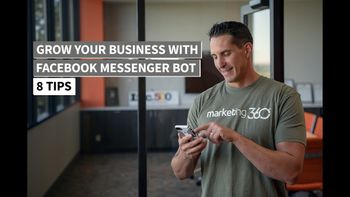
Use a Facebook Messenger Bot to Grow Your Business - 8 Tips

Digital Marketing Strategy - 7 Ways to Build Your Digital Presence

Social Media Tips - 8 Steps To Create The Perfect Social Media Marketing Strategy

Facebook Advertising Tips - Watch Ad Frequency to Avoid Ad Fatigue

Facebook Marketing For Business - 4 Best Tips

How To Increase Facebook Reach - 4 Tips

What is a Good Facebook Advertising Budget? 8 POWER TIPS

9 POWER TIPS for Running Effective Facebook Lead Ads
Get more free marketing power tips
An introduction to Facebook ads (6 principles you must understand about Facebook advertising)
The Facebook advertising platform is powerful, diverse, and complex. In this article, we offer an overview of Facebook Ads that will help you outline a strategy for your business.
Introduction
It’s called Facebook Ads, but this platform is unlike any advertising channel in history. It’s grounded in the lives of ordinary people, but run by extraordinary technology. It’s a place where advertisers can reach target audiences with precision, yet where it’s a constant challenge to catch their attention.
On the surface, advertising on Facebook seems simple. But it’s not. It only works when it’s part of a well-developed marketing strategy that has clearly outlined goals, a well-defined sales funnel, and a deep understanding of customers.
Facebook advertising cannot be explained in its entirety because it’s not static. If you’re reading a step-by-step guide on Facebook Ad tactics that’s a year old, it’s out of date.
If you’ve dabbled in Facebook advertising for your business, chances are you were disappointed. Most novice efforts fail because people don’t understand the scope of the work or know how to scale their campaigns to leverage data.
But there is hope – a great deal of hope. Facebook is an unprecedented treasure trove of personal data. And we mean personal. One of the major achievements we’ll outline here is how Facebook Ads is driving towards people-based marketing, which allows for targeting individuals across their devices with optimal timing and content.
It’s a great time to advertise a business so long as you have a vision of what you’re trying to achieve. Here are some of the fundamental principles you need to know about Facebook Ads. Keep them in mind as you create a strategy for this channel.
Facebook ads principle #1
One of the most important principles to understand about Facebook Ads is that your strategy must build around a sales funnel.
A lot of business owners new to Facebook Ads think they can create and deliver ads in a way similar to direct-response mailer or coupon. In fact, many novices design their ads like a coupon, with a limited-time special offer, super sale, or discount code. They’re hoping for one-and-done campaign that directly delivers a transaction.
You can set these up easily with Facebook offer ads, but they rarely work without refined targeting because Facebook is, at its core, a social network. People don’t go on Facebook to see coupons for oil changes or ads for self-help gurus. Facebook is personal interaction.
Any type of ad you put on Facebook is interruptive. It pushes its way into a person’s feed, between pictures of the cousin’s kids, cat memes, and the latest news.
Because of this, your ads have to appear native to the platform, especially during top of funnel engagement. If you’re targeting someone who’s never heard of you before, it’s your responsibility to tap into their interests. You’re on their turf.
There are a lot of details within the tactics of funnel optimization, but at the strategic level you need to keep two important steps in mind.
First is that the upper part of your funnel will focus on engagement, prospecting, and audience building. Initially, you run campaigns that target engagement, test the effectiveness of your content, and build out trackable audience lists. Your goals early on are awareness and demand generation.
These campaigns are built of ad sets that you’re split testing. Often you’ll run lower budgets that force the Facebook algorithm to optimize for your goals at the lowest costs.
The lower part of your funnel will focus on lead acquisition and transactions. Now you use retargeting and lookalike audiences so your ad sets are highly targeted. You’re using ads and content with a track record of success. You can invest more in these campaigns because your return on ad spend (ROAS) is likely to be much higher.
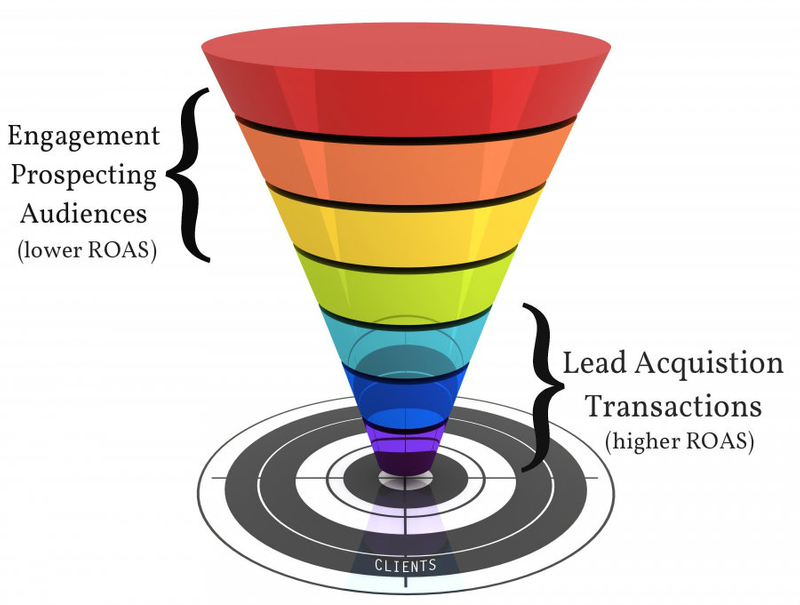
Facebook ads principle #2: Marketing Through Machine Learning
Another important fundamental to Facebook advertising – and increasingly to digital marketing as a whole – is algorithmic machine learning.
When you create an ad set, you set demographic targets, such as gender, age, and location. You also signify interests, such as people who like cooking or follow conservative talk show hosts.
Then you set a goal, such as getting a like, watching a video, or clicking through to your website to make a purchase.
When you start running the ads, Facebook will go through a “learning phase”:
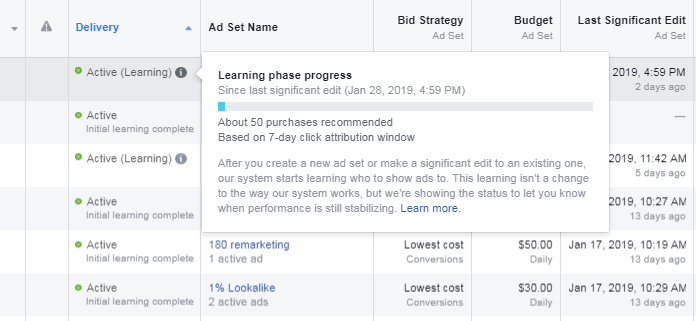
During this phase, Facebook is analyzing and determining who is most likely to take the action you’ve set-up in your goal.
What’s fascinating to note is that the program does this on the individual level. It’s not just targeting certain demographics or interests alone.
Facebook, as we know, has an incredible amount of data on its users. Intimate details about people’s interests, behaviors, and decision-making patterns. The algorithm correlates this data and targets your ads, person by person.
The algorithm optimizes your campaign with speed and accuracy that’s impossible to do manually. It’s terrific technology, but there are several important things to be aware of.
First, you have to realize that the goal you set is the goal the program will seek to fulfill. For example, if you create a campaign with the goal of getting post engagements, the algorithm will target people who tend to engage with posts on Facebook. If you target website sales, the algorithm will target people who most often click through ads and make website purchases.
You could run a similar post to the same general demographic/interest groups, but when you set different goals, Facebook targets different users.
There are also budgetary considerations (which we’ll talk more about in scaling). In short, if you’re over or under budget with respect to your goal, Facebook may either not show your ad enough to your prime target audience, or it may show it too much, moving to a secondary, less targeted audience.
You’ll never understand the internal workings of this algorithm, but be aware of how it goes about executing the goals you establish. It can execute the work of a million button pushers in an instant, but it’s up to you to know what you’re saying, who you’re trying to reach, and what you want them to do.
Facebook ads principle #3
This principle really applies to marketing in general, but it’s so vital with Facebook ads it needs to be addressed specifically.
On Facebook, you either really need to know the niche you’re trying to communicate with or you need to be running campaigns with the goal of learning about that niche.
Many advertisers obsess over persuasion and conversions, but on Facebook you also have to focus on affinity and connection. Before you can sell, you have to be social.
We can best illustrate this we a couple of examples. Take a look at this ad, which got huge engagement results for the brand:
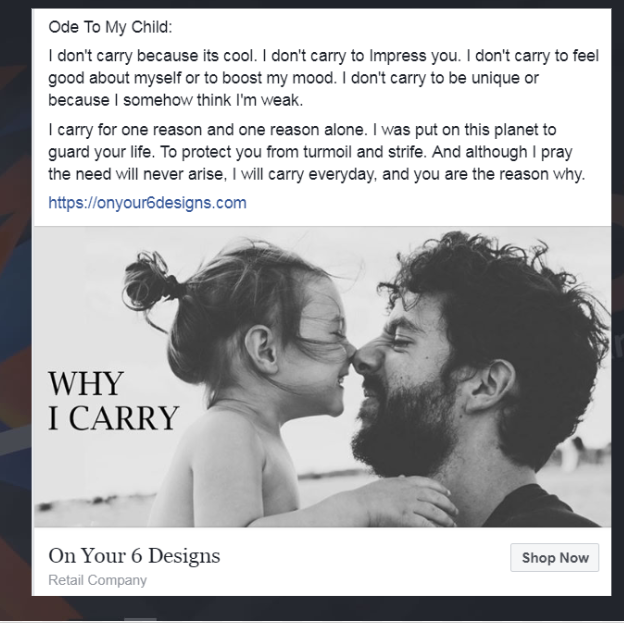
This brand sells gun holsters, specializing in concealment holsters for pistols. They know their target audience feels justified and proud about carrying a gun, and they want respect for one of their primary motivations: protecting their family.
This brand understands their audience on an emotional level. The ad resonates with their target audience; it reached nearly 40k new potential customers at a cost of just a few hundred dollars.
On Facebook, you want your ads to be part of the conversation, particularly when targeting engagement goals. But you can only really be part of that conversation if you speak in a social tone.
Digital marketers report across the board that being overly promotional doesn’t bode well for engagement. One marketer commented:
“When we do something fun or playful, we see about a 35% increase in click-through rates than when we post something promoting a sale-type offering,”
However, knowing your audience also means knowing where they are in the buying journey. This clothing brand knows that as they start to retarget people, shoppers want to see is the latest in-stock items:
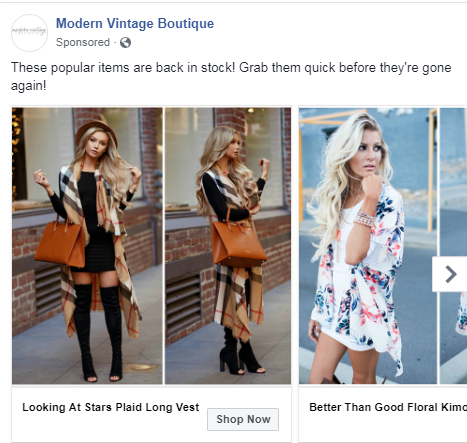
Facebook ads principle #4
Scaling campaigns on Facebook allows you to target a wider audience-base for testing purposes, then scale-up when you get data on what works. This is a vital ad management tactic that lets you improve targeting over-time without overspending on ineffective campaigns. Let’s outline an example of how this looks.
You start with horizontal scaling. Basically, this means you cast a wider net at first using lower budget engagement campaigns. You gain two things:
- You learn what types of people respond to what types of content.
- You develop audience lists you can use for when you scale up to retargeting campaigns.
To really understand why horizontal scaling is so important, think back to how Facebook uses machine learning to target campaigns and maximize budgets. As you develop campaigns and prepare to scale vertically, you’re building off of everything Facebook discovered about your target audiences.
Now you create campaigns with higher budgets because you know you’re targeting people further along in your sales funnel, more likely to act.
Of even greater importance is that as you get initial, low-risk engagements and draw first-time visitors to your website, you’re building retargeting lists. Also, you’re getting initial buyers you can use later as seed audiences for lookalike campaigns.
As you build these audiences, you scale vertically with larger budgets and conversion-based goals. Ultimately, you must create campaigns with positive ROAS (return on ad spend), which you then scale into more aggressive campaigns and profitability.
Facebook ads principle #5: Develop Fresh and Creative Ad Variations
Facebook users put demands on you as an advertiser. They expect ads to be personable and interesting. If they’re product-based, they better be about products the person is in the market for.
Your content must also stay fresh. You can’t just create a few ads sets and run them forever. If you do, you’ll run into the problem of ad fatigue. People will tire of seeing the same content from you and they’ll start skipping it. When that happens, Facebook stops showing it.
The user’s attention is the product on Facebook. They don’t charge people to use the platform, so they charge advertisers to get a piece of that attention.
Facebook wants users to come back to the platform (in fact, they prefer that people rarely leave) which involves a couple of basics.
First, people want to feel good. In general, Facebook is trying to create a “happiness ecosystem” that strives towards positivity. This is reflected in content policies. For example, you can’t generally advertise weight loss products on Facebook (because reminding someone they need to lose weight makes them feel bad, and if they feel bad they may stop using Facebook).
Second, people come to Facebook to see what’s new. Users expect their feeds to be refreshed with the latest fascinating content.
You have to engage different types of people with varied content that has distinct advertising goals. This content has to be interesting, useful and new.
It takes a lot of work to keep your content fresh and relevant across audiences, which is one reason many businesses hire social media management services to help them out.
Facebook ads principle #6: Facebook Seeks Advertising Partners
Facebook is a for-profit corporation. They have investors and their goal is to generate revenue. That revenue comes from the advertising system.
Facebook looks at professional, quality advertisers with funnels that deliver superior, long-term results as partners.
On the contrary, if you have a suboptimal funnel that delivers erratic (or no) results, they realize that your potential to become a long-term revenue generator is minimal.
If your ads are ineffective and your funnel is leaky, Facebook can’t fix that just by showing your content to different audiences. So what it ends up doing is not showing it at all or making it so expensive for you to display that there’s no ROAS potential.
Professional advertisers with funnels that drive results have an advantage on Facebook. Results indicate a positive experience for users, which means revenue for Facebook.
As soon as you put an ad out on Facebook the algorithm starts to analyze it. It looks at how fast people scroll over your ad. It evaluates the reactions your ad gets. It’s looking at comments, even analyzing the words used in the comments. It also knows if you have an effective landing page on your website.
If your ads aren’t cutting it, the algorithm won’t show your content much – if at all. It’s busy showing the content of advertisers who have profitable, effective funnels.
The good news is that Facebook wants you to succeed. It wants a positive experience for users that makes you money and, in turn, makes them money. That’s why they created such a robust advertising platform, and that’s why they support small business advertising partners like Marketing 360®:
Summary
Facebook advertising epitomizes the marketing process. We distill that process into a simple phrase:
Marketing is about doing more of what works and less of what doesn’t.
Facebook allows you to create a tremendous number of ad variations. Change your hooks, try a new image, target a different audience. With a modest amount of collateral, you can test a lot of ads.
Within those you’ll find gems. Ad copy with a certain type of media that connects with a particular audience. It may be long form copy driving website links. It may be duration of a video view. It might just be an initial like, or a high-end offline sale.
Mining for those gems is labor intensive. Ads manager is a vast platform that updates on a regular basis. To be successful on Facebook Ads, you need to invest both money and sweat.
Many businesses choose to hire a Facebook Small Business Solutions Partner like Marketing 360® to manage their campaigns. Given the depth of work involved and the expertise needed to be successful with Facebook advertising, this is a wise choice.
If all your time is consumed just running your business and working with clients, you don’t want to deal with Facebook advertising alone. It really is a beast of a platform, and it’s easy to waste money when you don’t know what you’re doing.
Contact us today to discuss your Facebook advertising needs. We have pros who do nothing but manage client accounts. Like Facebook, we want you to succeed. Our goal is to create great user experiences that lead to business profitability.
Facebook marketing best practices and case studies
Learn more about the Facebook Ads platform and see how it works first hand with our Marketing 360® clients.
Facebook Ads Personal Attributes Policy (Tips to Avoid Ad Disapproval)
Facebook Ad’s personal attributes is its most nuanced ad policy. Here’s a breakdown that will help you avoid having your ads disapproved for this area of noncompliance.
Facebook Ads Case Study: Involvement Leads to Engagement
Here’s a Facebook poll post Marketing 360® did for a client that shows how community involvement drives strong social media engagement for a brand.
Facebook Ads Split Testing – The Hows & Whys
Facebook offers efficient, effective split testing through its advertising platform. Here’s how to run split tests and (more importantly) why you should run them.
Facebook Ads for Restaurants – Examples and Tips
Facebook Ads are effective for restaurants. Here are some examples and ideas that will get your Facebook audience walking into your restaurant.
Facebook’s Anti-Discrimination Policy (How to Avoid Ad Disapproval)
Going against Facebook’s anti-discrimination policy is a fast way to have an ad disapproved – for reasons you’re probably not clear on. Let’s clear it up.
Facebook Business Post Examples and Ideas
Wondering what to post on your business Facebook page? Here are 6 ideas and examples to inspire you.
Facebook Ads for Plumbers – Examples and Tips
Considering running Facebook ads for your plumbing business? Here are some tips and examples from Marketing 360®.
Facebook Ads Customer Feedback – What You Need to Know
If you’re an eCommerce store running Facebook Ads, customer feedback impacts your delivery and costs. Here’s what you need to know.
How Will Automation Affect Business Marketing?
Call it automation, AI, or machine learning. It's coming and it's taking human control away from aspects of marketing. Here are some important considerations.
This is Why Your Small Business Needs a Facebook Business Page (And How to Design One That Converts!)
Today, Facebook business pages are becoming almost as important as websites. Here's an overview of why your business needs to set-up its business page, with tips on how to make sure it's an effective marketing tool.
Facebook Recommendations, Reviews, & Ratings - This is How They Help Your Business
Facebook is the social media platform with the most structured business review feature. Here's how it works, with tips on how you can use recommendations to boost your reputation and grow your business.
How to Showcase Testimonials in Facebook Ads
Learn how to use text in Facebook ad images so your ads won't get disapproved.
Why You Must Connect Your Facebook Ads Campaign Objective to Your Business Goals
One of the most important steps in creating a Facebook Ads campaign is making sure it's connected to a specific business goal.
Facebook Ads Glossary of Terms
Here is a glossary of the most important terms to know to create and implement a Facebook Ads marketing strategy.
